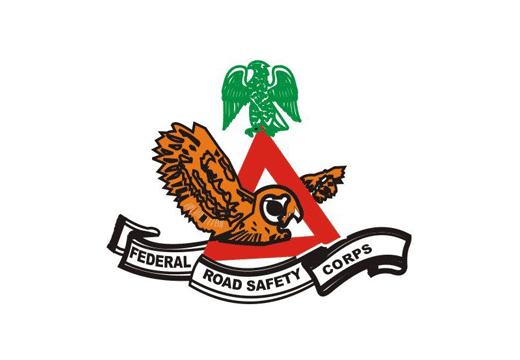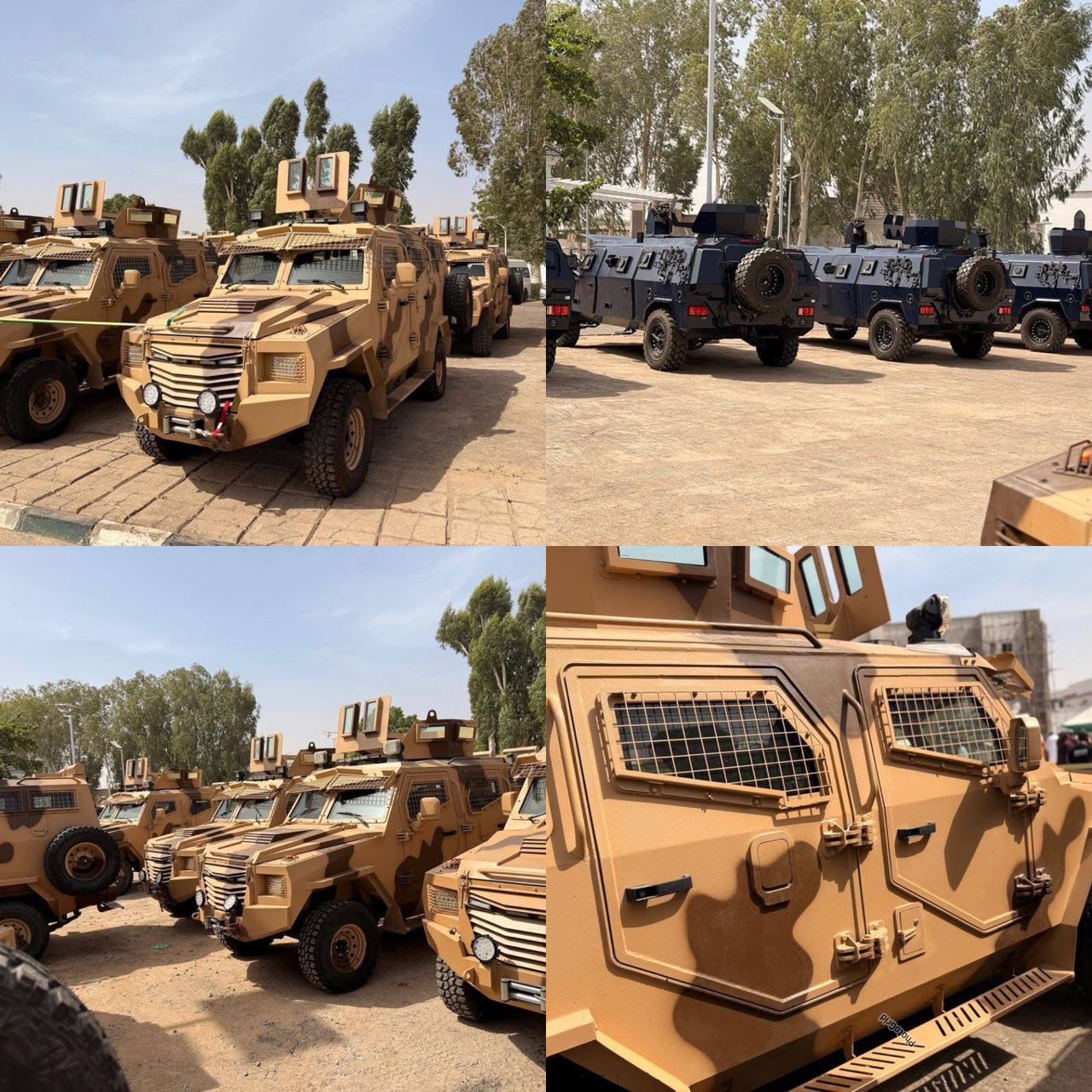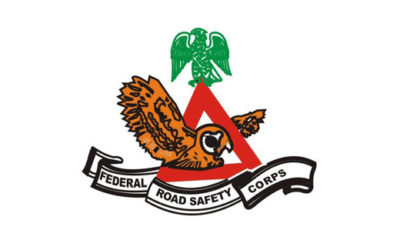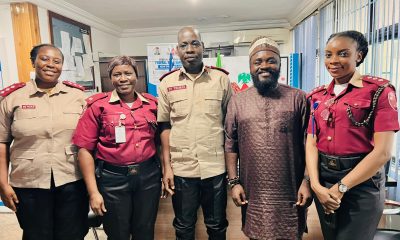society
Shehu Mohammed and the Evolution of Digitization in FRSC: A Tale of Road Safety Revolution in Nigeria

Shehu Mohammed and the Evolution of Digitization in FRSC: A Tale of Road Safety Revolution in Nigeria
From whatever perspective you choose to look at him, the Corps Marshal, Federal Road Safety Corps, Shehu Mohammed is a voyage in the transportation industry with a touch of class. One of the most outstanding safety practitioners whose efficiency, knowledge, diligence and professionalism have become another definition of standard in road safety administration and traffic management. I say this because, Men of unique achievements are celebrated anywhere in the world, and when their values are appreciated, they are not only spurred to do more, but also encouraged to inspire the younger generation. This article therefore explores the evolution of digitization in FRSC, its impact on road safety, and how the leadership of Mallam Shehu Mohammed has driven this transformation.
To begin with, a critical appraisal of this digital age suggests that innovation and technology have transformed various sectors, including the road transportation sector, especially in the area of safety of lives and properties of commuters on the road.
The Federal Road Safety Corps (FRSC), Nigeria’s premier road safety agency, has seen an unprecedented degree of digital revolution that has placed the lead agency at the forefront of unparalleled transformation.
The evolution of digitization at FRSC under Shehu Mohammed’s leadership has rekindled the light of hope in FRSC. By embracing technology, FRSC has enhanced efficiency, transparency, and service delivery, setting a benchmark for public sector innovation. As FRSC continues to push the boundaries of digitization, its impact on road safety will only continue to grow, saving lives and making Nigerian roads safer.
The present Corps Marshal whose trajectory dates back to more than 3 decades has been instrumental in driving FRSC’s digital transformation. His vision, strategic thinking, and commitment to innovation have inspired a cultural shift, positioning FRSC as a model for public sector digitization in Nigeria.
With a policy thrust that has Rejiged and repositioned operational activities through digital transformation, broadened the scope of strategic partnership, entrenched zero tolerance to indiscipline as well as enhanced welfare of staff, the Corps Marshal has revolutionised the lead agency and revived it’s Glory.
The Corps Marshal began his digital revolution on the administrative front with Electronic Document Management System ( Paperless) which will be launched soon. While on the operational front, he initiated and launched FRSC Mobile Application, a one-stop shop for all FRSC products and services, for ease of doing business and quality service delivery. The FRSC Mobile App was introduced to generate and analyse real time data on operations, Traffic Crashes data management, road conditions, and provide customers with feedback on the Corps’ products. The initiative targets at enhancing the operations of the Corps, so as to significantly improve the effectiveness and responsiveness of road safety management in Nigeria.
The Application provides the Corps with critical information, enables timely decision-making and swift action to ensure the safety of road users. The importance of the application and its impact on road safety administration cannot be emphasized as it ensures immediate incident response, dynamic traffic management, accurate and timely reporting, data-driven insights for Future Planning, etc.
Part of the features of this innovative App includes its ability to detect vehicle speed, black spots on the roads, remind drivers and vehicle owners about when to change their tyres, grant easy access to verification of drivers license, vehicle number plates as well as other FRSC products and services.
You could access the National Traffic Radio for real time traffic update, and also report road traffic crashes, obstructions and other emergencies.
Having understood that a well collated and analysed data drives decision-making and guides policy formulation and implementation, the Corps Marshal developed the National Crash Reporting Information System (NACRIS).
NACRIS complements the Corps efforts exhibited over the years to capture information about road traffic crash such as the inauguration of Road Traffic Crash Information system in 2014 and the harmonized reporting format of Road traffic Crash to align with international best practice. It is a web application that allows the Corps to analyse the economic, health and other burdens that road traffic crashes leaves on the shoulders of our nation, as well as helps in intelligence sharing with relevant stakeholders such as NPF, NEMA, NBS, NCDC, etc.
In less than hundred days in office, Shehu restored the integrity of the National Drivers License and resolved issues surrounding the production of the national drivers license and the vehicle number plates by strengthening the production capacity of the production plants which are presently performing at optimal level.
Added to this is the introduction of penalty point system as part of operational strategy to discourage abuse of traffic regulations.
Apparently with these milestones, Corps Marshal Shehu Mohammed is indeed a believer in success who goes the stretch to achieve it. He has proven to be a leader who leads by example and his leadership cuts across tribes, religion and cultural boundaries, without discrimination.
Fondly referred to as “Mr Welfare” by members of the Corps, Shehu Mohammed also broadened the scope of staff professionalism through enhanced capacity development. Part of the efforts in this regard include the expansion of slots for further studies for staff. For the first time in the history of the Corps, the entire arresting Marshal’s and Commanding Officers have been subjected to an intensive training that will enhance staff professionalism.
In the same vein, within the short period, the Corps Marshal ensured the promotion of officers as a catalyst for optimal performance. He has promoted 8 Assistant Corps Marshals to the rank of Deputy Corps Marshal while 28 Corps Commanders are presently awaiting their promotion to the rank of Assistant Corps Marshal.
To boost the morale of staff, he established the hall of fame where personnel who exhibit outstanding character are paraded and rewarded to boost their morale and general productivity of staff. This is in addition to hall of shame where personnel who engage in Patrol Misconduct/Incivility to the motoring public are paraded and given the punishment that is due to them.
Apart from the foregoing, the Corps under his leadership has commenced harmonization of the Ranking Structure and proper placement of Men of the other rank. Payment of transfer allowances and eradication of punitive posting from the Corps has also been in top speed.
Knowing the impact of mutual collaboration, he went further to strengthen partnership with International agencies (United Nations (UN), World Bank, World health Organization (WHO). As well as enhanced collaboration with transport unions and the Special Marshals.
A combination of these strategic efforts reflected in the 2024 Eid-El-KABIR special patrol, where the Corps recorded huge reduction in crashes, fatalities and injuries. 51% reduction in road traffic crashes, 38% reduction in number of people involved, and 39% reduction in number of people killed. Also, while 35% decrease was recorded in number of people injured, the Corps achieved 41% reduction in number of people rescued without injuries.
A trail blazer and one of the key member of the group who blazed the trail that transformed what is today known as the Lead Agency on road safety in the whole of Africa; Shehu Mohammed is a Prince from the royal throne of the Zauzzau Emirate, the Sulikin Arewan Zauzzau and a Double-Awardee, of FRSC Anti-Corruption and Transparency Monitoring Unit.
Bisi Kazeem, fsi, anipr, FISPON, a retired Deputy Corps Marshal, veteran road safety professional and a public relations expert, writes from Lagos, Nigeria.
society
Good Politics Or Just Power? Two Years After The Elections

Good Politics Or Just Power? Two Years After The Elections
Two years after the last general election, Nigerians are justified in asking a direct question: is our democracy stronger today than it was then? Democracy is not measured by how many offices a party controls or how loudly politicians speak. It is measured by integrity, accountability, and the lived experience of the people. Good Politics demands more than victory at the polls; it demands moral leadership and visible progress in the lives of citizens.
The debate over amendments to the Electoral Act should have provided an opportunity to deepen transparency and strengthen public confidence. Instead, hesitation to fully embrace reforms that safeguard credible vote transmission and accountability has fueled doubt. In a nation where electoral credibility remains fragile, any reluctance to reinforce safeguards sends the wrong signal. Good Politics stands firmly for processes that are open, fair, and beyond suspicion.
The party in power commands significant authority across the federation. With control of the presidency, many state governments, a strong presence in the National Assembly, and influence at local levels, there should be no anxiety about reforms that ensure free and fair elections. Confidence in leadership is demonstrated not by dominance, but by a willingness to subject power to scrutiny. Politics rooted in the omoluabi ethos embraces fairness, transparency, and responsibility, even when inconvenient.
This is the standard long associated with Awolowo, whose politics emphasized discipline, social welfare, education, and institutional strength. His vision was not merely about holding office, but about transforming society through principled governance. Good Politics follows that tradition. It rejects manipulation, arrogance, and the concentration of power without accountability. It insists that authority must serve the people, not itself.
Beyond electoral reforms, democracy must deliver tangible relief. Across the country, households struggle with rising prices and shrinking purchasing power. Small businesses are burdened by escalating costs. Young people search for opportunities that remain scarce. When economic hardship deepens, democracy feels abstract. Good Politics recognizes that political legitimacy is reinforced when citizens can see and feel the benefits of governance.
The concentration of power within a single political structure should translate into coordinated reform and measurable development. When it does not, questions naturally arise. Democracy weakens when dominance replaces performance. It weakens when loyalty to party eclipses loyalty to principle. The omoluabi tradition teaches that character defines leadership. Without character, authority becomes hollow.
A healthy democracy requires credible elections and compassionate governance. It requires leaders who understand that politics is a moral enterprise. Two years into this administration, many Nigerians remain uncertain about the direction of both our democratic processes and their daily welfare. If democracy is to endure, it must reflect Good Politics: fairness in competition, integrity in conduct, and compassion in governance. Anything less falls short of the standard that our history and our values demand.
news
GEN CHRISTOPHER GWABIN MUSA SUPPORT INITIATIVE COMMENDS STATE-FEDERAL COLLABORATION IN ZAMFARA

GEN CHRISTOPHER GWABIN MUSA SUPPORT INITIATIVE COMMENDS STATE-FEDERAL COLLABORATION IN ZAMFARA
The Gen Christopher Gwabin Musa Support Initiative (GCGMSI) has commended the Zamfara State Government for its decisive contribution to security operations through the donation of newly acquired armoured personnel carriers (APCs), surveillance drones, and other critical operational equipment to troops and security agencies in the state.
This commendation was contained in a statement signed by the Convener of the GCGMSI, Ibrahim Dahiru Danfulani, Sadaukin Garkuwan Keffi/Betara Biu, and made available to the press.
The equipment was formally commissioned on Wednesday, February 18, by the Grand Patron of the GCGMSI and Minister of Defence, General Christopher Gwabin Musa, OFR (rtd.), in a ceremony at the Government House, Gusau. The event was attended by senior military officers, heads of security agencies, and top officials of the Zamfara State Government.
The GCGMSI, in its statement, hailed the donation as a “transformative and timely intervention” that aligns perfectly with its core objective of advocating for and supporting tangible measures that enhance the operational capacity and welfare of Nigeria’s security forces. The Initiative praised Governor Dauda Lawal’s administration for moving beyond rhetoric to actionable, material support, describing the move as a “blueprint for state-level collaboration in national security.”
“The provision of these assets by the Zamfara State Government is a testament to visionary leadership and a profound commitment to the peace and stability of its people,” the GCGMSI statement read. “It represents the exact kind of synergistic partnership between state and federal authorities that the GCGMSI champions. This initiative will significantly close operational gaps, boost the confidence of our gallant troops, and send a strong message to criminal elements.”
Speaking at the commissioning, General Musa emphasized that sustained collaboration is indispensable in confronting the nation’s evolving security challenges. He specifically commended Governor Lawal for his proactive support.
“Governor Dauda Lawal has demonstrated exemplary leadership and an unwavering dedication to the security of Zamfara State,” the Defence Minister stated. “The provision of these armoured vehicles, surveillance drones, and other operational equipment will undoubtedly boost the morale and operational effectiveness of our troops and other security agencies on the ground. This is a commendable effort that should be emulated by others.”
The newly commissioned assets, which include multiple APCs and advanced surveillance drones, are expected to dramatically enhance the mobility, protection, intelligence-gathering, and rapid response capabilities of security forces, particularly in the state’s remote and difficult terrains where anti-banditry operations are ongoing.
In his remarks, Governor Lawal reiterated his administration’s steadfast commitment to being a reliable partner in the security architecture. He urged security agencies to deploy the new resources responsibly and effectively to safeguard lives and property.
The Federal Government, through the Ministry of Defence, reaffirmed its commitment to continuing and deepening such partnerships with state governments across the nation to strengthen coordination and resource allocation in the collective fight against insecurity.
The GCGMSI concluded its statement by urging other state governments to take a cue from Zamfara’s “bold and pragmatic” approach, affirming that such concrete support is vital for achieving lasting peace and security across Nigeria.
society
Governor Dauda Lawal Commissions 25 Armoured Personnel Carriers, Aerial Surveillance Drones to Combat Insecurity

Governor Dauda Lawal Commissions 25 Armoured Personnel Carriers, Aerial Surveillance Drones to Combat Insecurity
In a major boost to the fight against banditry and insecurity in Zamfara State and the North-West Zone, Zamfara State Governor, His Excellency, Dr Dauda Lawal, on Wednesday commissioned 25 new Armoured Personnel Carriers (APCs) and sets of surveillance drones for the military and other security agencies operating in the state.
The event, which took place in Gusau, was part of the state government’s ongoing effort to provide structured logistical support to frontline security forces and combat insurgency, banditry, and protect lives and properties. Speaking at the commissioning and handover, Governor Lawal emphasised that the new assets are intended to enhance troop protection during high-risk deployments and improve rapid response capabilities in remote communities, ensuring tactical battle and overhead surveillance for victory.
“We have provided over 600 specialised motorcycles, 150 Hilux vehicles, and 20 Buffalo vehicles to our security forces. These 25 highly sophisticated APCs being commissioned today are therefore part of a broader reform to improve response to security threats. The APC’s significantly improves troop protection during deployments into high-risk areas. They reduce vulnerability during patrols, support convoy security along major routes, and strengthen rapid response capability when distress calls arise from remote communities.” the Governor stated.
Governor Lawal explained that the security challenges of recent years had disrupted farming, limited trade, and undermined public confidence across the state. He noted that his administration’s “Rescue Mission” agenda has focused on moving from fragmented responses to structured reforms, including the establishment of a Zamfara State Security Trust Fund and the operationalisation of Community Protection Guards to improve grassroots intelligence.
The Governor specifically highlighted the importance of integrating modern technology into security operations. He noted that the newly acquired drones would expand aerial surveillance, improve situational awareness, and support better coordination between command centres and troops in the field.
“Real-time information strengthens decision-making and reduces operational blind spots,” he added.
Governor Lawal however acknowledged the critical role of the Federal Government under President Bola Ahmed Tinubu, noting that recent federal budgets have allocated over three trillion naira to defence, a commitment he said strengthens subnational stabilisation efforts.
He urged the military commanders and personnel receiving the equipment to ensure disciplined maintenance and intelligence-guided deployment. “Enhancing your safety enhances the safety of our communities,” he told the troops.
Governor Lawal also told the people of Zamfara that; his administration remains resolute in restoring enduring security and peace across every Local Government Area. “We will sustain preventive measures, strengthen patrol architecture in rural corridors, deepen inter-state intelligence collaboration across the North-West, and maintain fiscal prudence in security expenditure. Stabilisation will continue through structured planning, lawful enforcement, and institutional reform.”
The Governor also linked the security investment to economic recovery, stressing that stability in rural areas is essential for agricultural productivity, market activity, and food security.
The event was attended by the Honourable Minister of Defence, General Christopher Musa (Rtd.), who formally commissioned the assets for operational service. Governor Lawal reaffirmed his administration’s resolve to sustain preventive measures and inter-state security collaboration until lasting peace is restored across all Local Government Areas in Zamfara.
-

 celebrity radar - gossips6 months ago
celebrity radar - gossips6 months agoWhy Babangida’s Hilltop Home Became Nigeria’s Political “Mecca”
-

 society6 months ago
society6 months agoPower is a Loan, Not a Possession: The Sacred Duty of Planting People
-

 society5 months ago
society5 months agoReligion: Africa’s Oldest Weapon of Enslavement and the Forgotten Truth
-

 news6 months ago
news6 months agoTHE APPOINTMENT OF WASIU AYINDE BY THE FEDERAL GOVERNMENT AS AN AMBASSADOR SOUNDS EMBARRASSING








